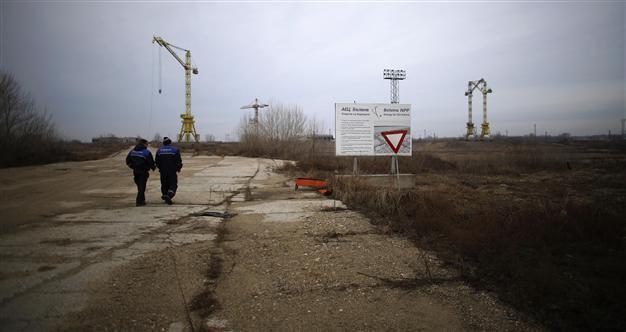Bulgarians vote in referendum on new nuclear plant
SOFIA - Agence France-Presse

Workers walk near the construction site of Bulgaria's second nuclear power plant in Belene, some 230 km (143 miles) north of Sofia January 24, 2013. REUTERS photo
Bulgarians voted Sunday on whether to revive plans ditched by the government to construct a second nuclear power plant, in the EU member's first referendum since communism.The vote was seen as a popularity contest for political parties ahead of elections in July, even though low turnout was expected to render the result of the referendum invalid.
The referendum asks 6.9 million eligible voters: "Should Bulgaria develop nuclear energy by constructing a new nuclear power plant?" At stake is an on-again, off-again project for a 2,000-megawatt facility on the Danube river at Belene on the northern border with Romania that was first conceived in 1987.
Severe financial constraints and the inability to attract a foreign investor after the withdrawal of German energy giant RWE in 2009 prompted the right-wing government of Prime Minister Boyko Borisov to abandon the project last March.
The opposition Socialists initiated the referendum after Atomstroyexport, the state-owned Russian firm set to build Belene, filed a compensation claim for one billion euros ($1.3 billion).
The referendum must have a turnout equal to that of the last general elections, or 4.35 million voters, to be valid.
Surveys however indicate that this will be a tall order, with apathy on the rise and most voters uncertain about the project's cost and economic feasibility.
Eve-of-ballot surveys suggested that a mere 1.6 to 2.1 million people would vote, with 60-62 percent in the "yes" camp compared with 38-40 percent against.
By 10:00 am (0800 GMT), four hours into voting, turnout was just 2.16 percent compared with 9.95 percent at the same time in the 2009 general election.
Nevertheless, both the former communist Socialist party and Borisov's right-wing GERB party see the referendum as an important popularity test before the July general elections.
A recent Alpha Research poll showed waning support for GERB, at about 21 percent, still ahead of the Socialists on 18.5 percent -- although their popularity has been rising.
"Bulgarians need to come and vote 'yes' if they don't want to be governed by an ex-cop like Boyko Borisov," Nevyana Georgieva, 28, told AFP outside a polling station in downtown Sofia. "I will definitely vote with 'no' -- against the communists and against Russia's efforts to push through its interests here," added another voter who braved the winter cold, translator Veselin Mladenov, 53.
The Belene project was a priority for Atomstroyexport as its first in a EU-member state. Critics however have warned that it would strengthen Moscow's energy grasp on the small former Soviet bloc Balkan state, which gets almost all of its oil and gas from Russia.
The country's single nuclear power plant at Kozloduy, which was partially shut to secure Bulgaria's EU accession in 2007, is also Soviet-built.
Support for the new project was expectedly strongest in the small municipality of Belene on Sunday, whose 9,500 people are hoping it will revive the northwestern region, officially the poorest in the entire EU.
"I voted 'yes' as this project will create jobs and keep our children here," Tsvetana Todorova, 58, said while queueing to vote outside a station in Belene.
Polling were due to close at 7:00 pm (1700 GMT) with exit polls expected soon afterwards.
If participation exceeds 20 percent of the 6.9 million voters, and over half of them vote "yes," parliament will have to review the issue within three months. But it is not obliged to revive the deal.
















